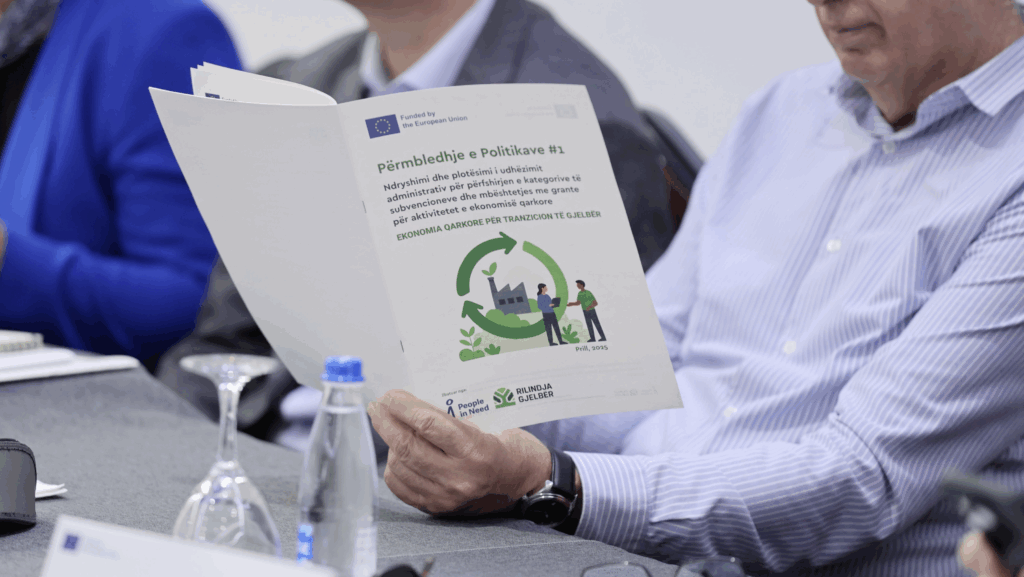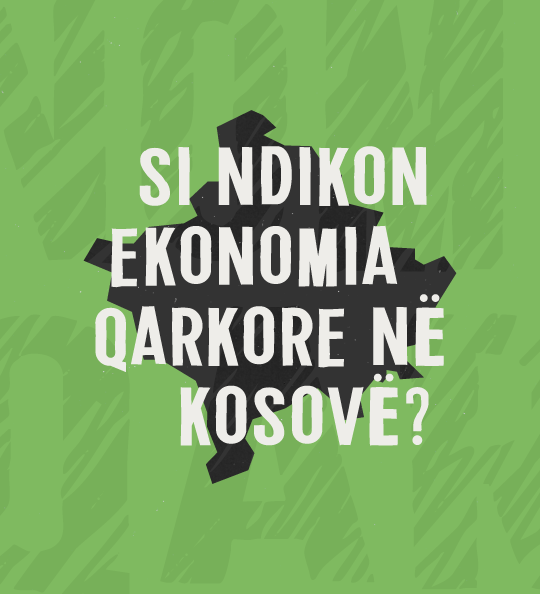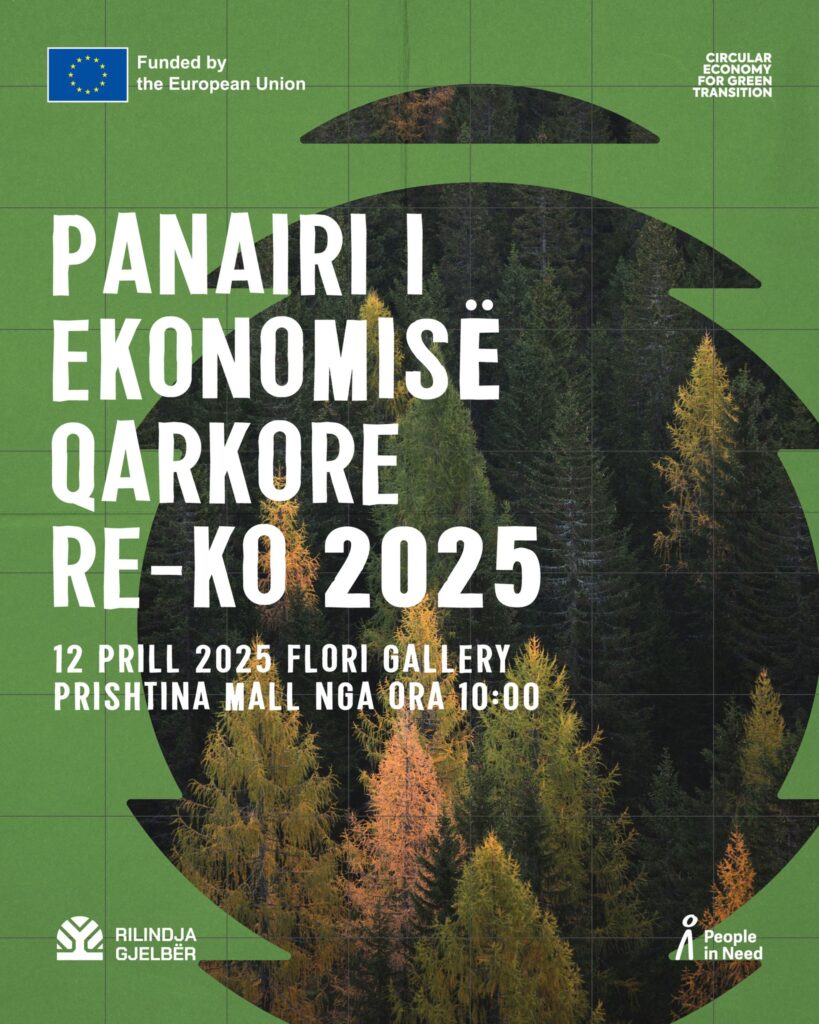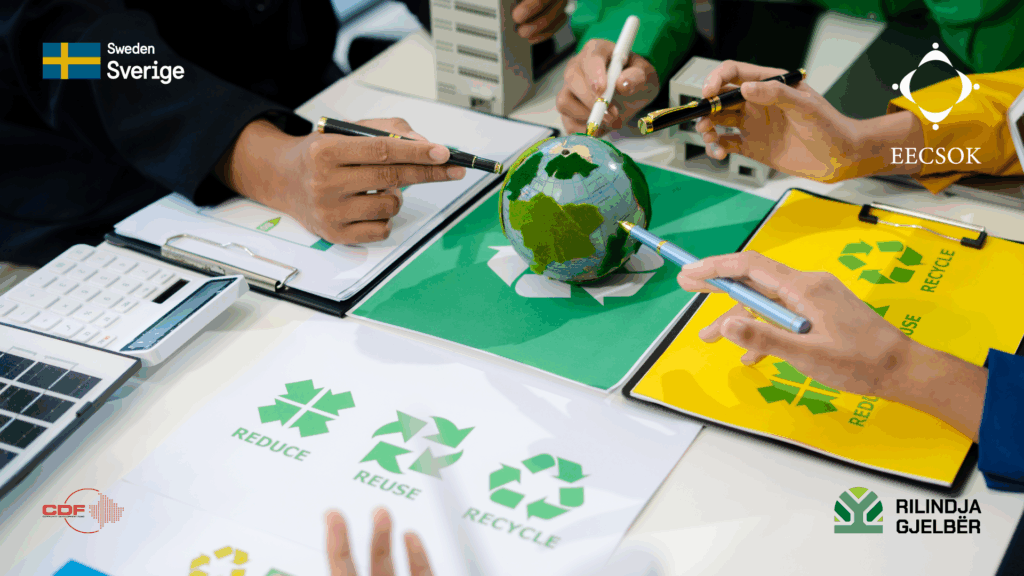Kosovo’s Circular Economy Roadmap
To advance sustainability and reduce environmental impact, Kosovo has introduced a Circular Economy Roadmap (2023), developed in collaboration with the Ministry of Environment, Spatial Planning, and Infrastructure (MMPHI) and international partners. This roadmap outlines strategic actions across six key sectors, chosen based on their economic significance, environmental footprint, and potential for circular transformation. By focusing on these priority areas, Kosovo aims to minimize waste, promote resource efficiency, and align with EU environmental policies (MMPHI, 2023).
Introduction
In response to mounting environmental and economic challenges, Kosovo has taken a decisive step toward building a sustainable and resource-efficient future by introducing its Circular Economy Roadmap (2023). Developed in partnership with the Ministry of Environment, Spatial Planning, and Infrastructure (MESPI) and international partners, including the United Nations Development Programme (UNDP), the roadmap outlines Kosovo’s strategic vision to transition from a linear economic model to a circular economy, in line with the European Union’s Green Agenda for the Western Balkans.
The document, officially published by MESPI, outlines targeted actions across six priority sectors based on their environmental impact, economic relevance, and potential for circular transformation. Kosovo’s aim is to foster resource efficiency, minimize waste, and create green economic opportunities.
Source: Kosovo Circular Economy Roadmap 2023 – MESPI
From Linear to Circular: Kosovo’s Strategic Vision
Kosovo’s economic model has traditionally been linear—extracting resources, consuming them, and disposing of waste with minimal reuse or recycling. However, unsustainable consumption, urbanization pressures, and environmental degradation have prompted a paradigm shift.
The Circular Economy Roadmap envisions an economy where materials are continually repurposed, reducing dependence on virgin resources, lowering greenhouse gas emissions, and supporting Kosovo’s alignment with EU environmental directives.
The roadmap focuses on six priority sectors where Kosovo has the highest potential to integrate circular practices, drive innovation, and foster sustainable growth.
1. Food System: Reducing Waste and Advancing Sustainable Agriculture
Kosovo faces significant challenges with food waste, much of which ends up in landfills and contributes to methane emissions and environmental degradation.
Strategic Actions:
- Implement food waste reduction programs through improved storage, distribution, and supply chain practices.
- Promote organic waste management via composting and the development of bioenergy solutions.
- Encourage sustainable agriculture, including regenerative farming methods and a reduction in the use of synthetic pesticides.
- Support bio-based packaging alternatives, replacing single-use plastics with compostable materials.
Optimizing the food system will not only enhance agricultural sustainability but will also reduce organic waste and improve food security across Kosovo.
2. Forest System: Safeguarding Biodiversity and Combatting Deforestation
Forests in Kosovo are critical for carbon sequestration, biodiversity protection, and soil preservation. However, illegal logging and unsustainable forest practices continue to pose serious threats.
Strategic Actions:
- Strengthen enforcement against deforestation through improved monitoring systems and stricter regulations.
- Promote sustainable forestry by balancing timber harvesting with systematic reforestation efforts.
- Increase the use of recycled wood in construction and manufacturing to reduce demand for virgin timber.
- Support the adoption of bio-based materials to replace fossil fuel-derived products.
By advancing responsible forest management, Kosovo will enhance its capacity to combat climate change and preserve ecosystems.
3. Built Environment: Advancing Sustainable Construction and Infrastructure
The construction sector is one of the largest contributors to raw material consumption and waste generation. To address this, Kosovo is promoting circular practices in the building and infrastructure sectors.
Strategic Actions:
- Increase the utilization of recycled construction materials, such as reclaimed concrete, bricks, and metals.
- Adopt modular construction techniques that enable disassembly and reuse of building components.
- Enforce green building standards, including energy efficiency measures, rainwater harvesting systems, and the integration of renewable energy sources.
- Support urban planning approaches that integrate green infrastructure and promote sustainable mobility.
These measures will reduce resource extraction, lower carbon emissions, and foster the development of resilient urban environments.
4. Manufacturing: Facilitating the Shift to Cleaner Industrial Production
Kosovo’s manufacturing sector plays a pivotal role in the country’s economy but is also a significant generator of industrial waste.
Strategic Actions:
- Introduce cleaner production technologies to minimize material loss and reduce energy consumption.
- Support remanufacturing, repair, and reuse of industrial components and products.
- Assist companies in reshaping supply chains to source locally and reduce reliance on imported materials.
- Stimulate innovation in advanced recycling technologies, ensuring that waste streams are valorized and reintegrated into the economy.
By driving circularity in the manufacturing sector, Kosovo can enhance resource efficiency while strengthening its industrial competitiveness.
5. Creative Industries: Enabling Circular Practices in Fashion and Design
The creative sector, including fashion, design, and artisanal industries, has significant potential to adopt circular practices and reduce waste, particularly in the textile sector.
Strategic Actions:
- Promote sustainable fashion brands that prioritize the use of organic and recycled materials.
- Support upcycling initiatives, transforming discarded materials into new, high-value products.
- Expand second-hand marketplaces to extend the lifecycle of clothing, furniture, and other consumer goods.
- Foster eco-conscious design practices that combine traditional craftsmanship with modern circular principles.
A transition to circular creative industries will reduce waste generation and promote sustainable entrepreneurship.
6. Retail Sector: Promoting Sustainable Consumption and Reducing Packaging Waste
The retail sector has an influential role in promoting responsible consumption and reducing single-use packaging waste.
Strategic Actions:
- Reduce packaging waste by adopting eco-friendly packaging alternatives.
- Implement return-and-reuse systems that enable consumers to return containers and packaging for refilling or recycling.
- Encourage circular business models, such as product leasing, rental services, and sharing platforms.
- Promote sustainable consumer choices through eco-labeling and incentives for environmentally responsible behavior.
Through these measures, Kosovo aims to reduce consumption-driven waste streams and shift toward a circular retail economy.
The Road Ahead: Toward a Green, Circular Kosovo
Kosovo’s Circular Economy Roadmap represents an ambitious national strategy to foster sustainable economic growth while minimizing environmental impact. Its successful implementation will:
- Reduce waste and environmental pollution, improving public health and ecosystem resilience.
- Enhance resource efficiency and reduce Kosovo’s dependence on imported raw materials.
- Stimulate the creation of green jobs in sectors such as recycling, sustainable production, and eco-services.
- Align Kosovo’s environmental policies with EU standards, supporting the country’s EU integration process.
For Kosovo to fully realize these benefits, collaboration among government institutions, private sector actors, civil society, and the public is essential.
Conclusion
The Circular Economy Roadmap positions Kosovo at the forefront of sustainable innovation in the region. By rethinking how products are designed, used, and disposed of, Kosovo has an opportunity to establish a regenerative and competitive economy that respects planetary boundaries.
Sustained investment in education, capacity-building, and green infrastructure, along with strong political will, will be key to achieving this transition. As Kosovo embraces circular economy principles, it can emerge as a regional leader in sustainability and circular innovation.





